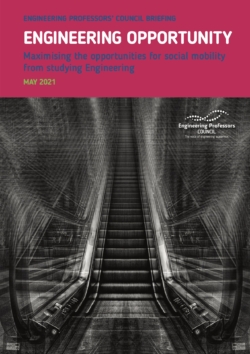This week, the EPC published its report on the contribution to social mobility made by studying Engineering. Chief Executive Johnny Rich and Research Assistant Vicky Howell sum up the key findings.

The starting point for the EPC’s new report Engineering Opportunity: Maximising the opportunities for social mobility from studying Engineering is that, on average, Engineering graduates go on to earn more than most other graduates. That fact won’t surprise anyone, but the report explores the story behind it and has wide implications for higher education policy and supporting social mobility.
Compared to other subject areas, Engineering graduates do rather well financially. Starting salaries are already an average of £6,200 higher when compared to the median for all graduates and, by ten years after graduation, that’s risen to £11,700.
However, we also found evidence that engineering is not a sector in which these salary rewards are restricted to those who already had everything going for them. Even when you take account of characteristics such as prior attainment and socio-economic disadvantage, the salary premium persists.
In fact, when you look at students who entered Engineering with BTECs – a group which includes many disadvantaged students – their earnings boost is even greater than it is for the high-attaining A level students. Similarly, the data on getting a job and remaining in secure employment is also favourable.
In other words, studying Engineering boosts earnings significantly, regardless of background, and so supports social mobility.
So far, so self-congratulatory. However, our report goes on to acknowledge that Engineering may be a great social leveller, but as a discipline, we are not doing enough to make its advantages more accessible to the students from the very backgrounds who would benefit most.
Just one in eight students in higher education comes from the fifth of areas with the lowest participation rates (Quintile 1 in POLAR4), but in Engineering the proportion is lower still at less than one in ten.
The reasons for this ‘drawbridge effect’ – where there’s a feast to be had, but only if you can get across the moat – are varied.
- Engineering is a demanding subject and so its entry requirements are often demanding too. High tariffs can not only exclude capable students with lower prior attainment, but can discourage them from even applying.
- Because Engineering is not taught in schools, most people are as likely to think of ‘an engineer’ as someone who fixes a washing machine as someone who designs smart materials, builds spacecraft, or solves climate change challenges. This means Engineering tends to attract those who actually know an engineer in their family. In other words, it replicates its historical social profile.
- Both outside the discipline and sometimes even within, Engineering is seen as sciency (whereas, in reality, it is often as creative and practical as it is technical and theoretical) and therefore Maths and Physics are often regarded as the appropriate qualifications. In an education system where stretched schools and colleges struggle to offer A levels in these courses and have neither the resources nor the teachers to offer every pupil the chance to do triple science (ie. Chemistry, Physics and Biology) at GCSE, then it’s no surprise this becomes a filter that favours the privileged.
For these reasons and many others, the Engineering drawbridge is in stubborn need of greasing. Interestingly, however, Engineering could be seen to have the potential to be more flexible than most subjects in its entry requirements, not less. The absence of Engineering from the school curriculum means that whatever prior attainment a student might have, it will only ever be a rough proxy for their capacity to succeed as an engineer.
This has implications for the minimum entry requirements the government is considering for access to English higher education funding. Any arbitrary cut-off tariff would have to relate to the students’ attainment in subjects other than the one they want to study. Not only would this limit social mobility, it would also undermine Engineering’s ability to recruit students to a subject area that is strategically critical in rebuilding the economy.
Skills shortages in engineering are such that school-leavers alone cannot plug the gap. We need what Paul Jackson has described as ‘intersectoral mobility’ – people with experience in the workforce retraining in engineering roles. The drawbridge must be lowered for them too.
The EPC report makes a range of recommendations, many of which would support social mobility both in and outside engineering.
Among these is a reminder that fair access is worth examining at the discipline level and that well-intentioned system-wide incentives and metric approaches may have unintended consequences at course level where the actual admissions take place. The recruitment challenges of access in Engineering, for example, may encourage institutions to dodge the difficulties by expanding courses with a better record of attracting POLAR Q1 students, even though they may ultimately have less good social mobility outcomes.
Perhaps the most timely recommendation for the government to note relates to foundation years. These are the entry pathway for 12% of engineering graduates, including many of those BTEC-entrants and returners who not only gain most value themselves, but also repay most of their loans and are most important to attract for the sake of the economy.
The report states, “Foundation courses, ideally with minimal procedural transition into degree study, are more effective than other access courses [AHEDs] because the continuity of study in the same institution supports progression.”
By way of analogy, it compares the progression of students who start and complete an MEng with the smaller numbers who embark on a BEng and then decide to progress to Masters level. If you set the sights high for student with potential, they will achieve more than they thought possible to start with.
The Augar Review set its gunsights on foundation years as being no more than a more costly alternative to HE Access diplomas. Whatever one thinks of the recommendations of Augar, most of them had their reasoning clearly demonstrated. The proposal on foundation years, however, seemed conspicuous by its lack of any evidential basis.
When the government responds fully to the Review later in the year, the EPC report (like the Policy Perspectives Network) suggests that the best service to disadvantaged students, to Engineering and to the nation’s economic imperatives would be to expand foundation years rather than to axe them.
Foundation years – and the opportunity they offer to transition into higher education in general, or Engineering in particular – are critical to lowering the drawbridge for entry and inviting disadvantaged students to the feast beyond.
For the most part, the data findings of the Engineering opportunity report relate to England only and not to the devolved nations. It is important to make it clear that this was a consequence of the availability of comparable data. We hope to undertake further research in other nations of the UK in future.



